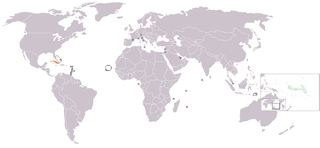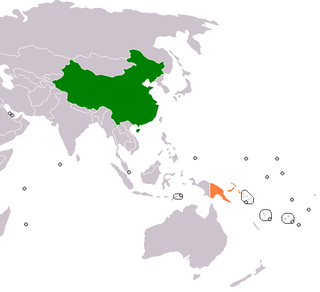
Cuba's foreign policy has been fluid throughout history depending on world events and other variables, including relations with the United States. Without massive Soviet subsidies and its primary trading partner, Cuba became increasingly isolated in the late 1980s and early 1990s after the fall of the USSR and the end of the Cold War, but Cuba opened up more with the rest of the world again starting in the late 1990s when they have since entered bilateral co-operation with several South American countries, most notably Venezuela and Bolivia beginning in the late 1990s, especially after the Venezuela election of Hugo Chávez in 1999, who became a staunch ally of Castro's Cuba. The United States used to stick to a policy of isolating Cuba until December 2014, when Barack Obama announced a new policy of diplomatic and economic engagement. The European Union accuses Cuba of "continuing flagrant violation of human rights and fundamental freedoms". Cuba has developed a growing relationship with the People's Republic of China and Russia. In all, Cuba continues to have formal relations with 160 nations, and provided civilian assistance workers – principally medical – in more than 20 nations. More than one million exiles have escaped to foreign countries. Cuba's present foreign minister is Bruno Rodríguez Parrilla.

Fiji has experienced many coups recently, in 1987, 2000, and 2006. Fiji has been suspended various times from the Commonwealth of Nations, a grouping of mostly former British colonies. It was readmitted to the Commonwealth in December 2001, following the parliamentary election held to restore democracy in September that year, and has been suspended again because of the 2006 coup, but has been readmitted a second time after the 2014 election. Other Pacific Island governments have generally been sympathetic to Fiji's internal political problems and have declined to take public positions.

Kiribati is a full member of the Commonwealth, the IMF and the World Bank, and became a full member of the United Nations in 1999. Kiribati hosted the Thirty-First Pacific Islands Forum in October 2000. Kiribati has Least Developed Country Status and its interests rarely extend beyond the region. Through accession to the Lomé Convention, then Cotonou Agreement, Kiribati is also a member of the African Caribbean and Pacific Group. Kiribati maintains good relations with most countries and has particularly close ties to Pacific neighbours Japan, Australia, and New Zealand. Kiribati briefly suspended its relations with France in 1995 over that country's decision to renew nuclear testing in the South Pacific.

Papua New Guinea's foreign policy reflects close ties with Australia and other traditional allies and cooperative relations with neighboring countries. Its views on international political and economic issues are generally moderate.

The foreign policy of the Solomon Islands as of 2008 was described by the Solomon Islands government as a "look north" policy, aimed as strengthening diplomatic and economic relations with Asian countries for development purposes.

Oceania is, to the People's Republic of China and the Republic of China, a stage for continuous diplomatic competition. The PRC dictates that no state can have diplomatic relations with both the PRC and the ROC. As of 2019, ten states in Oceania have diplomatic relations with the PRC, and four have diplomatic relations with the ROC. These numbers fluctuate as Pacific Island nations re-evaluate their foreign policies, and occasionally shift diplomatic recognition between Beijing and Taipei. The issue of which "Chinese" government to recognize has become a central theme in the elections of numerous Pacific Island nations, and has led to several votes of no-confidence.

Cuba–Pakistan relations refers to the bilateral relationship of Cuba and Pakistan. Relations between the countries strengthened after Cuba provided humanitarian assistance to the victims of the 2005 Kashmir earthquake. Both the nations continue to strengthen the bilateral relations especially in the fields of higher education, agriculture, industry and science and technology and have also held talks for military cooperation.
Cuban-Pacific relations are diplomatic, economic, cultural and other relations between the Republic of Cuba and countries situated in Oceania. In the 2000s, Cuba has been strengthening its relations with Pacific nations, which have, for the most part, responded favourably to Cuban medical aid in particular. The first Cuba-Pacific Islands ministerial meeting was held in September 2008 in Havana, with government members from ten Pacific countries—Kiribati, Tuvalu, Nauru, Solomon Islands, Fiji, Tonga, Vanuatu, Samoa, the Federated States of Micronesia and Papua New Guinea—attending. The meeting was a consolidation rather than a starting point of Cuban-Pacific relations.

Diplomatic relations between Kiribati and Cuba developed in the 2000s (decade). Like other countries in Oceania, Kiribati is a beneficiary of Cuban medical aid; bilateral relations between Tarawa and Havana must be viewed within the scope of Cuba's regional policy in Oceania.

Relations between Vanuatu and Cuba began shortly after the former gained its independence from France and the United Kingdom in 1980, and began establishing its own foreign policy as a newly independent state. Vanuatu and Cuba established official diplomatic relations in 1983.

The Republic of Kiribati and the People's Republic of China (PRC) established diplomatic relations on June 25, 1980, and resumed on September 27, 2019. Between 2003 and 2019, The government of Kiribati recognized the Republic of China, and, in accordance with the "One China" policy, the People's Republic of China did not have diplomatic relations to the country.

The Independent State of Papua New Guinea and China (PRC) established official diplomatic relations in 1976, soon after Papua New Guinea became independent. The two countries currently maintain diplomatic, economic and, to a lesser degree, military relations. Relations are cordial; China is a significant provider of both investments and development aid to Papua New Guinea.

Samoa and China (PRC) established official diplomatic relations in 1976. The two countries currently maintain cordial relations; China provides economic aid to Samoa.

The Republic of Vanuatu and the People's Republic of China (PRC) established official diplomatic relations on March 26, 1982. China established an embassy in Vanuatu in 1989, while Vanuatu established an honorary consulate in China in 1999; it officially became an embassy in 2005. The current Ambassador of China in Vanuatu is Liu Quan. The current Ambassador of Vanuatu in China is former Minister of Finance Willie Jimmy.

Relations between Tuvalu and the Republic of Cuba are recent, having developed in the 2000s (decade). Like other countries in Oceania, Tuvalu is a beneficiary of Cuban medical aid; bilateral relations between Funafuti and Havana must be viewed within the scope of Cuba's regional policy in Oceania.

Diplomatic relations between China and the Federated States of Micronesia were established on September 11, 1989. The Chinese government first established an embassy in the capital of Palikir in 1990, and dispatched its first ambassador in 1991. Initially, the Micronesian ambassador to Tokyo, Japan also served as Micronesia's ambassador to China, before Micronesia established an embassy in Beijing in 2007. President John Haglelgam was the first senior government agent from Micronesia to visit China, doing so in 1990. The current Chinese ambassador to Micronesia is Zhang Weidong, while the Micronesian ambassador to Beijing is Akillino H. Susaia.
Simeon Bouro is a Solomon Islands politician and diplomat.

India–Solomon Islands relations refers to the international relations between India and Solomon Islands. Neither country has a resident ambassador. The High Commission of India in Port Moresby, Papua New Guinea is concurrently accredited to the Solomon Islands
The Solomon Islands no longer has official diplomatic ties with Taiwan (ROC) due to the One-China policy since 2020.

















